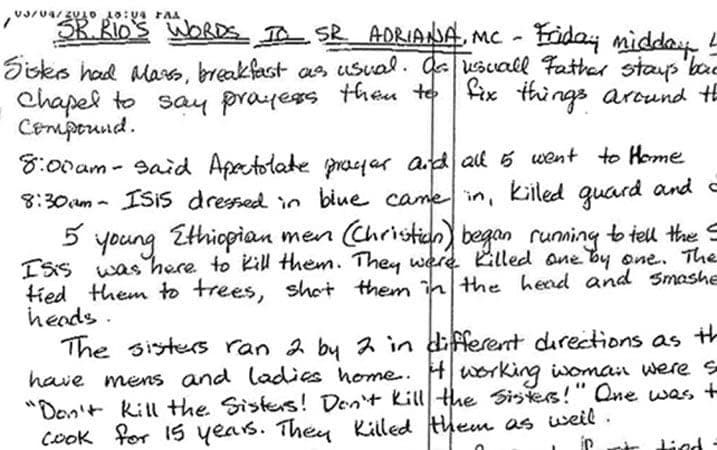ROME — On the morning of March 4, life at a Yemen compound run by five nuns of the religious order founded by Mother Teresa began as usual, with Mass, breakfast, and prayer. Yet it soon turned into 90 minutes of terror, as armed members of ISIS bent on killing the nuns and their volunteer aides stormed the facility.
Sixteen people died that day, including four nuns: Sisters Anselm, Marguerite, Regina, and Judith. (Members of the Missionaries of Charity are typically identified only by their first names.) Salesian Rev. Tom Uzhunnalil, a priest living in the compound, was kidnapped by the ISIS gunmen and is still missing.
A fifth nun, Sister Sally, the superior of the local community, lived to tell the story.
Crux has obtained a copy of a memorandum describing a conversation between Sister Sally and another member of the order, Sister Rio, about the events that day. Although Crux could not independently confirm its authenticity, the document contains details that suggest an eyewitness account.
“Sister Sally is fully surrendered,” Sister Rio is quoted as saying, describing the nun’s acceptance of God’s will for her fate. “The police are trying to get her out because [ISIS] will just keep after her until they kill her.”
“Whatever God wants,” Sister Sally is quoted saying about the threat. Speaking about the people who were murdered, Sister Sally “said to pray that their blood will be the seeds for peace in the Middle East and to stop the ISIS.”
Of the four nuns who were killed, two came from Rwanda, one from India and one from Kenya. The 12 volunteers who died with them were from Yemen and Ethiopia.
The first to be killed were a guard and a driver for the Missionaries of Charity sisters. Soon after, five young Ethiopian men who tried to warn the sisters were tied to trees by their wrists and shot in the head before having their skulls smashed.
The sisters split up, trying to reach two nursing homes contained within the compound, in order to protect the patients. Four women, including a cook who had been working with the religious for 15 years, began screaming “Don’t kill the sisters, don’t kill the sisters!”
They, too, were slain.
Sister Sally ran to the convent to try to warn Uzhunnalil. He had heard the screaming, and instead of trying to escape, he ran to the chapel to consume all the consecrated hosts it contained so that the assailants would not be able to defile them.
Every religious article in the chapel was destroyed, including its tabernacle, altar, and crucifix, as well as an image of the Virgin Mary.
A neighbor saw the terrorists force the priest into a car; he hasn’t been seen since.
The 3,000-strong Catholic population in Muslim-majority Yemen represents less than 0.01 percent of the national total of 24 million. According to the 2015 Catholic Almanac, there are currently four priests serving four parishes in Yemen, located on the southern coast of the Arab peninsula.
One of those priests is Uzhunnalil, originally from India. He’d been living with the religious sisters since last September, when his local church was burned down.
Life for Christians in Yemen has always been precarious. However, the situation became worse in early 2015, with a civil war born of a growing animosity between Sunni and Shia Muslims and fueled by foreign nations such as Iran and Saudi Arabia.
According to the United Nations, more than 6,000 civilians have lost their lives in the crossfire, with some 14 million people risking malnutrition.
The religious sisters and their volunteer aides could have been killed at any time during the fighting, but according to the document recording Sister Sally’s observations, they died on that morning because “God wanted it to be clear they are martyrs for the faith.”
The document also says that Pope Francis had asked his secretary to contact the Yemeni Secretary of State on a regular basis to check on the Missionaries of Charity, and to reassure them of his closeness.
The police arrived on the scene at 10:30 a.m., barely two hours after the terrorists had barged into the compound. They were called by the son of the cook, who feared for his mother’s life.
The 16 victims were found with their hands tied, a gunshot to their heads, and their skulls crushed.
Sister Sally survived by hiding behind the door in the refrigerator room. Three times the aggressors went into the room, trying to find her with no success.
Police had to force her out of the compound because she refused to leave the people living in the nursing homes. She recalls in the document that they kept crying “Don’t leave us, stay with us,” but the police convinced her that ISIS gunmen would continue searching for her because they knew there were five nuns.
“Sister Sally told Sister Rio she is so sad because she is alone and did not die with her sisters,” the memorandum says. “Sister Rio told her God wanted a witness and told her, ‘Who would have found the sisters’ bodies, and who would ever tell us what happened? God wants us to know.’”
The deaths of the four Missionaries of Charity sisters came just 10 days before the Vatican announced that Pope Francis has set a date of Sept. 4, 2016, for the canonization of Mother Teresa, a ceremony in which she formally will be declared a saint of the Catholic Church.
The Missionaries of Charity were established by Mother Teresa in 1950, and number some 4,500 religious sisters worldwide.

















